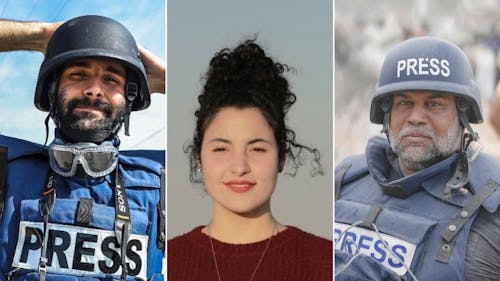LETTER TO THE EDITOR: Reexamining Time's 'Person of the Year' choice in shadows of Palestinian journalists

In an era defined by increasing global interconnectedness and an array of pressing challenges, Time Magazine's decision to designate Taylor Swift as "Person of the Year" has ignited both applause and dissent.
While Swift's significant contributions to the music industry and her noteworthy activism undoubtedly warrant recognition, this award prompts crucial questions about whether the spotlight might have been more judiciously directed elsewhere — specifically toward the muted voices of Palestinian journalists.
A formidable force in the entertainment industry, Swift has utilized her platform to champion various social and political causes, from LGBTQ+ rights to voter engagement. Nevertheless, the ongoing struggles in the Middle East, particularly the challenges faced by Palestinian journalists, beckon for attention and acknowledgment on a global scale.
For weeks, Motaz Azaiza's Instagram feed has been a chronicle of the horrors unfolding in Gaza. The 24-year-old photojournalist, born and raised in the Deir al-Balah refugee camp, has dedicated his days since October 7 to capturing the scenes of death, destruction and anguish associated with the current genocide occurring in Palestine. Azaiza stated, "The phase of risking your life to show what's happening is now over, and the phase of trying to survive has started."
Meanwhile, young filmmaker Bisan Owda has gained worldwide attention for her heart-wrenching video updates from Gaza, where she speaks of diminishing hopes of survival, physical illness and nightmares. In an Instagram post earlier this month, she proclaimed, "My message to the world: You are not innocent of what is happening to us … humanity will not forgive you."
Plestia Alaqad, a 22-year-old freelance journalist, fled Gaza last month, fearing that her reporting could jeopardize her family's safety. Wael Dahdouh, a 52-year-old journalist, covered the news of Gaza City tirelessly, only to say a final goodbye to his wife, son, daughter and grandson, who were killed in an Israeli air raid.
In the heart of one of the world's most enduring conflicts, Palestinian journalists relentlessly work to report on the ground, providing a critical perspective that often goes unnoticed. These individuals navigate through conflict zones and operate under restrictive conditions that hinder their ability to freely report the truth. Many Palestinian journalists have paid the ultimate price, sacrificing their lives to shed light on the harsh realities faced by their people.
Their stories merit recognition, not only for the courage displayed in their profession but also for their contribution to a global understanding of complex geopolitical issues. By highlighting the struggles of Palestinian journalists, we underscore the importance of a free press in regions plagued by conflict, fostering empathy and understanding worldwide.
While Swift's influence in advocating for social causes is undeniable, the responsibility lies in choosing causes that amplify the voices of the most marginalized. By selecting Swift as "Person of the Year" over Palestinian journalists, Time Magazine missed an opportunity to use its platform to bring attention to a group of individuals whose narratives desperately need to be heard.
In 2022, following Russia's invasion of Ukraine, Time Magazine selected Ukrainian President Volodymyr Zelensky as "Person of the Year." The contrast between this year's and last year's picks raises questions about the consistency and priorities in the magazine's editorial decisions. While Zelensky's recognition was important, the juxtaposition with Swift's accolade emphasizes the need for a more nuanced and diverse selection process that considers different contexts and global issues.
This is not a call to diminish Swift's accomplishments or activism. Instead, it's a plea for a reevaluation of the criteria used to select figures for such prestigious titles. By diversifying the pool of candidates and elevating those whose voices are consistently stifled, we contribute to a more inclusive and empathetic society.
In recognizing Palestinian journalists, we acknowledge the resilience and perseverance of those who face adversity daily, advocating for their right to tell their stories without fear of reprisal. The global community must strive to uplift the silenced voices and work collectively toward a future where every person, regardless of their background, can freely express themselves without fear of persecution.
Swift's "Person of the Year" accolade is undoubtedly a celebration of her achievements, but it should also serve as a reminder to critically assess the choices we make in highlighting individuals whose impact extends beyond the headlines. In the spirit of fostering global awareness and understanding, let us strive for a more inclusive acknowledgment of those whose stories are yet to be fully told.
Yassmin Elmouzaieg is a School of Arts and Sciences first-year.
*Columns, cartoons and letters do not necessarily reflect the views of the Targum Publishing Company or its staff.
YOUR VOICE | The Daily Targum welcomes submissions from all readers. Due to space limitations in our print newspaper, letters to the editor must not exceed 900 words. Guest columns and commentaries must be between 700 and 900 words. All authors must include their name, phone number, class year and college affiliation or department to be considered for publication. Please submit via email to oped@dailytargum.com by 4 p.m. to be considered for the following day's publication. Columns, cartoons and letters do not necessarily reflect the views of the Targum Publishing Company or its staff.



